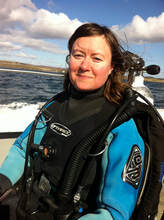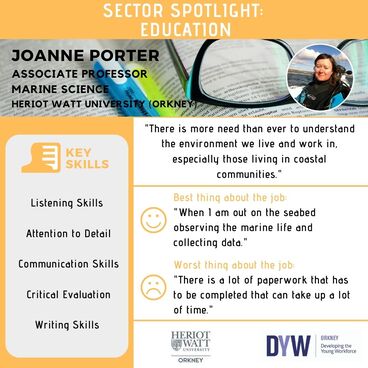 In our final Sector Spotlight on Education, we hear from Joanne Porter who is the Associate Professor in Marine Science at Heriot Watt University Orkney. Childhood holidays to the seaside sparked an interest in the natural world which a Tutor at Sixth Form College recognised, encouraging Joanne to study Marine Biology at University. This led to her undertaking her PhD and working in research before undertaking her current role as a member of academic staff heading up a research team.  Can you describe a typical day in your role as Associate Professor Marine Science? In my job my day can be quite varied. I might be in the laboratory teaching a class about the biology of marine animals, or I might be out at sea doing research. I am a trained SCUBA diver and I spend time on different types of seabed to collect data about biodiversity of habitats, and samples for analysis of DNA, carbon. I also use sensors on the seabed to collect environmental data such as current flow, temperature and salinity to help me understand how these influence the marine life that is living there. How did you end up in this role? I started out by doing A Levels at the Sixth Form College in Stoke-on-Trent, it’s about as far away from the sea as anywhere! Our two-week family holiday at the seaside were always a highlight in my young life. I spent many happy hours exploring rockpools and watching snails crawling around and wondering what they would eat. While at sixth form my tutor recognised my interest in the natural environment and suggested to me that I might enjoy studying either Marine Biology or Horticulture at university. I had not thought that it was possible to study marine life and have a career doing that, and so the conversation was a turning point in my life. I was accepted to study Marine Biology at Newcastle University and during that time I realised that I had an innate curiosity to understand why marine life lives where it lives, and the role that it plays in the ecosystem. It was a natural step for me to go on to study for a PhD research degree. For those four years I studied marine Bryozoa that live on seaweeds and rocks in the intertidal zone. I studied their morphology, reproduction and also their population genetics. Since then I have never looked back, having now spent more than 25 years in marine science, as a researcher and now as a member of academic staff with my own research team. I am currently focussing on collecting data to understand more about the size of the carbon stores that are found in habitats that are found in the coastal waters of Orkney. These habitats include maerl beds, horse mussel reefs, seagrass meadows, flame shell beds and kelp forest. There is a lot still to be learned about our marine environment, how it helps to regulate the climate of our planet, how it supports food production for humans and how energy can be extracted from the ocean. Scientists are needed to provide the data that is then used by industry and by policy makers so that sustainable decision making can be made and so that the general public can also understand their responsibility for the safe upkeep of our marine environment for future generations. What is the best thing about your job? The best thing about my job is when I am out on the seabed observing the marine life and collecting the data that is needed. I also really enjoy sharing my skills and knowledge with my students. What is the worst thing about your job? In my job, there is also a lot of paperwork that has to be completed so that I can do my work, this include applying for funding, completing risk assessment documentation. These aspects take up quite a lot of time and have to be completed carefully so that my team has the resources needed to keep our research coming in. What skills do you need to undertake your role? To undertake my role, good listening skills are needed, attention to detail, good writing skills and critical evaluation of experimental design. We also communicate a lot about the results that we gather, and so having good communication skills and being able to produce and explain visual representations of the data are very important aspects. What qualifications do you have? Alongside my degree and PhD, I have the following qualifications:
Would you recommend this job to young people, if so why? Yes, I think being a Marine Scientist is a fantastic job, and there is so much that we still do not know about our marine world. With the Blue Economy set to grow there is more need than ever, for us to understand the environment we live and work in, especially those living in coastal communities. Visit Heriot Watt Orkney on: Website: https://www.hw.ac.uk/uk/orkney.htm Facebook: https://en-gb.facebook.com/ICITOrkney/ Twitter: https://twitter.com/icitorkney?lang=en Comments are closed.
|
Archives
June 2024
Categories
All
|
 RSS Feed
RSS Feed